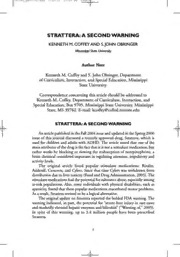Table Of ContentCoffey_pp01-02.qxd 1/20/12 11:00 AM Page 1
STRATTERA:A SECOND WARNING
KENNETH M.COFFEY AND S.JOHN OBRINGER
Mississippi State University
Author Note
Kenneth M. Coffey and S. John Obringer, Department
of Curriculum, Instruction, and Special Education, Mississippi
State University.
Correspondence concerning this article should be addressed to
Kenneth M. Coffey, Department of Curriculum, Instruction, and
Special Education, Box 9705, Mississippi State University, Mississippi
State, MS 39762. E-mail: [email protected]
STRATTERA:A SECOND WARNING
An article published in the Fall 2004 issue and updated in the Spring 2006
issue of this journal discussed a recently approved drug, Strattera, which is
used for children and adults with ADHD. The article noted that one of the
main attributes of the drug is the fact that it is not a stimulant medication, but
rather works by blocking or slowing the reabsorption of norepinephrine, a
brain chemical considered important in regulating attention, impulsivity and
activity levels.
The original article listed popular stimulant medications: Ritalin,
Adderall, Concerta, and Cylert. Since that time Cylert was withdrawn from
distribution due to liver toxicity (Food and Drug Administration, 2005). The
stimulant medications had the potential for substance abuse, especially among
at-risk populations. Also, some individuals with physical disabilities, such as
spasticity, found that these popular medications exacerbated motor problems.
As a result, Strattera seemed to be a logical alternative.
The original update on Strattera reported the bolded FDA warning. The
warning indicated, in part, the potential for “severe liver injury in rare cases
and markedly elevated hepatic enzymes and bilirubin” (“Warning of,” 2005).
In spite of this warning, up to 3.4 million people have been prescribed
Strattera.
1
Coffey_pp01-02.qxd 1/20/12 11:00 AM Page 2
2 PHYSICAL DISABILITIES:EDUCATION AND RELATED SERVICES
On June 9, 2010 the FDA warned doctors that children and adolescents
who used Strattera were at increased risk of suicidal ideation. This black box
warning states, “Strattera increased the risk of suicidal ideation in short-term
studies in children or adolescents with attention-deficit/hyperactivity disorder
(ADHD). Anyone considering the use of Strattera in a child or adolescent
must balance this risk with the clinical need. Co-morbidities occurring with
ADHD may be associated with an increase in the risk of suicidal ideation
and/or behavior. Patients who have started on therapy should be monitored
closely for suicidality (suicidal thinking and behavior), clinical worsening, or
unusual changes in behavior. Family and caregivers should be advised of the
need for close observation and communication with the prescriber. Strattera is
approved for ADHD in pediatric and adult patients. Strattera is not approved
for major depressive disorder (Drug Facts, 2011).
A statement from Lilly’s chief medical officer stated, “While suicidal
thinking was uncommon in patients on the medication during clinical trials,
it is important for parents to be aware it can occur and to discuss any unusual
symptoms with a physician” (Lumpkin, 2005, para. 19).
It is important to note that the increased risk is for suicidal thoughts, rather
than suicide attempts. The concern is that the increase in suicidal thoughts may
lead to an increase in suicide attempts. Additionally, this risk is higher when an
individual first begins Strattera or during a dosage adjustment. The overall risk
is relatively low, 0.4% (Drug Facts, 2011) and appears to be limited to children
and adolescents with no reports of increased suicidal ideation among adults
taking Strattera. The FDA does not advise people to stop taking Strattera but to
watch for signs of suicidal thinking (“ADHD medicines,” 2010).
REFERENCES
ADHD medicines: Suicide warning for Strattera. (2010). Web MD. Retrieved
July 18, 2011 from http://www.webmd.com/a-to-z-guides/adhd-
medicines-suicide-warning-for-strattera-topic-overview
Drug facts and comparisons(2011). St. Louis, MO: Wolters Kluwer.
Food and Drug Administration. (2005, October). Information for healthcare
professionals:
Pemoline tablets and chewable tablets (marketed as Cylert). Retrieved July 18,
2011 from http://wwwfda.gov/drugs/drugsafety/postmarketdrugsafety-
informationforpatientsandproviders/ucm126461.htm
Lumpkin, J. J. (2005). FDA warns about ADHD drug Strattera. Retrieved
July 18, 2011 from http://www.ldonline.org/xarbb/topic/13307
Warning of liver-damage risk for atomoxetine. (2005). The Brown University
Child and Adolescent Psychopharmacology Update,7(1), 8.

